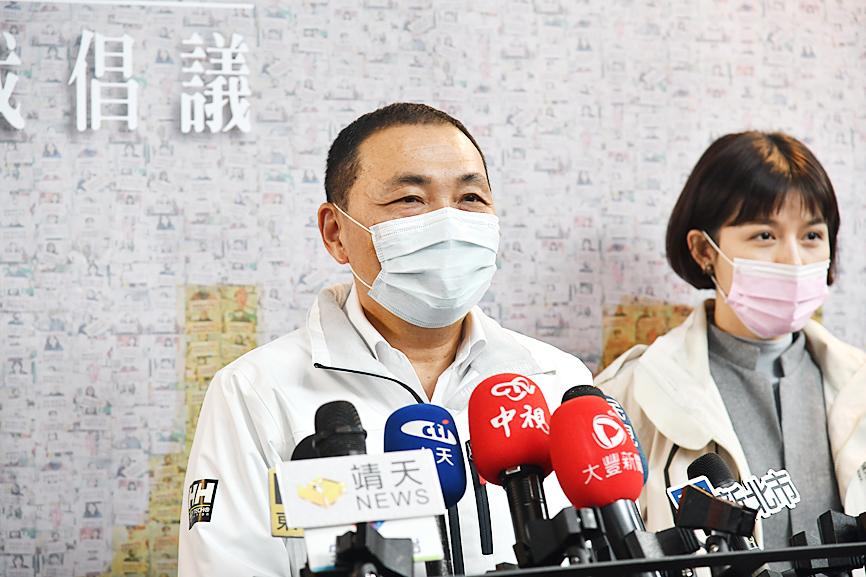The New Taipei City Government yesterday announced it would downsize a New Year’s Day flag-raising ceremony on Friday at city hall and postpone a fireworks display in Bali District (八里) to prevent the spread of COVID-19.
New Taipei City Mayor Hou You-yi (侯友宜) said that the city government would step up its COVID-19 prevention efforts this week, particularly of outdoor gatherings.
If officials have trouble enforcing a real-name system to track participants and regulate crowds at an event, they should consider canceling it or holding it later, Hou said.

Photo: Lai Hsiao-tung, Taipei Times
The city government and 29 district offices had planned to hold flag-raising ceremonies on Friday, but the New Taipei City Department of Civil Affairs said that it would downsize the events, adding that each district office should assess if it is able to enforce disease prevention measures, including crowd control, and ensuring people wear masks, sign health declaration forms and have their temperatures taken.
“In the past, we have had nearly 10,000 city residents attend flag-raising ceremonies. As the pandemic continues to rage worldwide, we have to consider the high infection risks of holding such a large event, where crowds and close contact with strangers are inevitable. The occurrence of an isolated case or cluster of infections would pose a challenge to the nation’s disease prevention system,” New Taipei City Department of Civil Affairs Director Ko Ching-chung (柯慶忠) said.
“Following a careful assessment, we have decided to downsize the flag-raising ceremony at the city hall plaza and will broadcast it live online. We will also cancel the distribution of free canvas bags on Friday and give them out another time,” he said.
The New Taipei City High Riverbank Construction Management Office said it would postpone a fireworks show in Bali.
“The fireworks would be launched over a 500m-wide area, and the disease prevention restricted area is about 1,200m. We would not be able to effectively set up a restricted area and track every participant. The area is also close to the Tamsui River (淡水河), where people would gather to watch the fireworks. Risk of virus outbreaks are high under these circumstances,” the office said.
The show was to be a warm-up for an event at the Tamkang Bridge (淡江大橋), which is to be completed in 2024, it said, adding that it would reschedule when the pandemic has subsided.
Separately yesterday, Taoyuan Mayor Cheng Wen-tsan (鄭文燦) said the city would decide by tomorrow whether to cancel the city’s New Year’s Eve party at the High Speed Rail’s Taoyuan Station Plaza.
Additional reporting by Wei Chin-yun

The Grand Hotel Taipei on Saturday confirmed that its information system had been illegally accessed and expressed its deepest apologies for the concern it has caused its customers, adding that the issue is being investigated by the Ministry of Justice Investigation Bureau. The hotel said that on Tuesday last week, it had discovered an external illegal intrusion into its information system. An initial digital forensic investigation confirmed that parts of the system had been accessed, it said, adding that the possibility that some customer data were stolen and leaked could not be ruled out. The actual scope and content of the affected data

DO THEY BITE IT? Cats have better memories than people might think, but their motivation is based entirely around the chance of getting fed Cats can remember the identity of the people who fed them the day before, Taipei-based veterinarians said on Friday, debunking a popular myth that cats have a short memory. If a stray does not recognize the person who fed them the previous day, it is likely because they are not carrying food and the cat has no reason to recognize them, said Wu Chou Animal Hospital head Chen Chen-huan (陳震寰). “When cats come to a human bearing food, it is coming for the food, not the person,” he said. “The food is the key.” Since the cat’s attention is on the food, it

A New York-based NGO has launched a global initiative to rename the nation’s overseas missions, most of which operate under the name "Taipei," to "Taiwan Representative Office (TRO)," according to a news release. Ming Chiang (江明信), CEO of Hello Taiwan, announced the campaign at a news conference in Berlin on Monday, coinciding with the World Forum held from Monday through Wednesday, the institution stated in the release. Speaking at the event, Democratic Progressive Party Legislator Huang Jie (黃捷) said she believed this renaming campaign would enable the international community to see Taiwan

TOO DANGEROUS: The families agreed to suspend crewed recovery efforts that could put rescuers in danger from volcanic gases and unstable terrain The bodies of two Taiwanese tourists and a Japanese pilot have been located inside a volcanic crater, Japanese authorities said yesterday, nearly a month after a sightseeing helicopter crashed during a flight over southwestern Japan. Drone footage taken at the site showed three bodies near the wreckage of the aircraft inside a crater on Mount Aso in Kumamoto Prefecture, police and fire officials said. The helicopter went missing on Jan. 20 and was later found on a steep slope inside the Nakadake No. 1 Crater, about 50m below the rim. Authorities said that conditions at the site made survival highly unlikely, and ruled